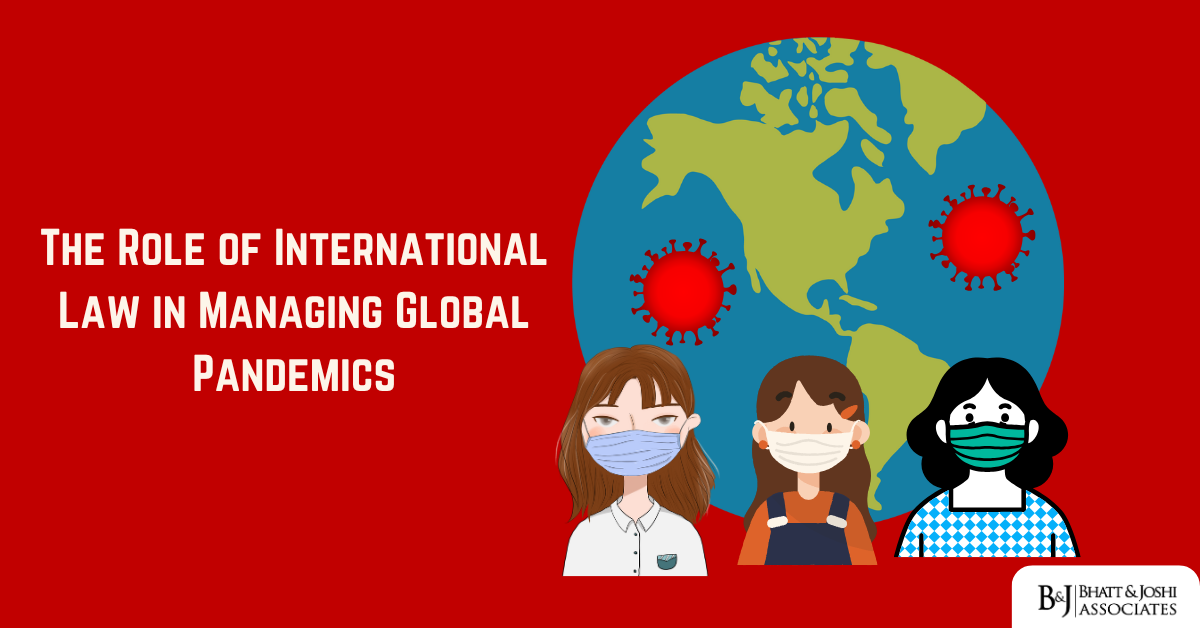Introduction
The COVID-19 pandemic underscored the critical need for coordinated international responses to public health emergencies. Global pandemics pose unique challenges, transcending borders and affecting every aspect of society, from healthcare systems and economies to human rights and international relations. International law plays a vital role in managing global pandemic by establishing norms, promoting cooperation, and ensuring accountability. This article explores the legal frameworks for managing global pandemics, their effectiveness during the COVID-19 pandemic, and the need for reforms to strengthen future public health responses.”
Legal Frameworks for Managing Global Pandemics
International law provides a range of instruments and mechanisms to address public health emergencies. Key frameworks include:
- International Health Regulations (IHR) 2005:
- Adopted by the World Health Organization (WHO), the IHR is a legally binding instrument that aims to prevent, detect, and respond to public health emergencies of international concern (PHEIC).
- The IHR establishes obligations for states to:
- Notify the WHO of potential health emergencies.
- Strengthen core public health capacities for surveillance and response.
- Facilitate international cooperation and transparency.
- WHO Constitution:
- As the governing document of the WHO, the constitution empowers the organization to coordinate international health responses and provide technical assistance to member states.
- International Covenant on Economic, Social and Cultural Rights (ICESCR):
- Article 12 recognizes the right to the highest attainable standard of health, obligating states to take measures to prevent and control infectious diseases.
- Trade and Travel Agreements:
- Agreements under the World Trade Organization (WTO) and International Civil Aviation Organization (ICAO) address the impact of pandemics on trade and travel, ensuring that health measures do not unnecessarily restrict international flows.
Effectiveness During the COVID-19 Pandemic
The COVID-19 pandemic tested the effectiveness of these legal frameworks, revealing both strengths and weaknesses:
- Successes:
- The WHO’s declaration of COVID-19 as a PHEIC facilitated global awareness and mobilization.
- International collaborations, such as the COVAX initiative, aimed to ensure equitable vaccine distribution.
- Challenges:
- Delayed Responses: Many states delayed notifying the WHO of initial outbreaks, undermining early containment efforts.
- Lack of Compliance: States often prioritized national interests over international obligations, such as hoarding medical supplies and imposing unilateral travel bans.
- Equity Issues: Vaccine nationalism and unequal access to resources highlighted disparities between high-income and low-income countries.
- Misinformation: The proliferation of misinformation hindered public health measures and eroded trust in institutions.
Legal Challenges in Global Pandemic Management
- Sovereignty vs. Global Cooperation:
- While international law emphasizes state sovereignty, pandemics require collective action and adherence to global norms, creating tensions.
- Enforcement Mechanisms:
- The IHR lacks robust enforcement mechanisms, relying on voluntary compliance by states.
- Human Rights Implications:
- Pandemic measures, such as lockdowns and mandatory vaccinations, have raised concerns about the balance between public health and individual freedoms.
- Resource Disparities:
- Low-income countries often lack the resources to comply with international obligations, exacerbating global health inequities.
Recent Developments and Proposals for Reform
- Pandemic Treaty Negotiations:
- In 2021, the WHO initiated negotiations for a new pandemic treaty to strengthen global health governance. Key priorities include:
- Improved surveillance and early warning systems.
- Equitable access to medical countermeasures.
- Enhanced funding mechanisms.
- In 2021, the WHO initiated negotiations for a new pandemic treaty to strengthen global health governance. Key priorities include:
- Strengthening the IHR:
- Proposals to amend the IHR include creating mechanisms for independent monitoring, improving transparency, and ensuring accountability for non-compliance.
- Global Health Equity Initiatives:
- Efforts such as the WHO’s Universal Health Coverage agenda and the Access to COVID-19 Tools (ACT) Accelerator aim to address resource disparities.
- Digital Tools and Data Sharing:
- Leveraging technology for real-time data sharing and contact tracing while addressing concerns about privacy and cybersecurity.
Case Studies
- Ebola Outbreak (2014-2016):
- The delayed international response to the Ebola outbreak in West Africa highlighted weaknesses in global health governance. Lessons learned informed subsequent reforms to the IHR.
- H1N1 Influenza (2009):
- The WHO’s swift declaration of a PHEIC facilitated global action but faced criticism over vaccine distribution and communication strategies.
- COVID-19 Pandemic:
- The pandemic underscored the interconnectedness of health, trade, and security, emphasizing the need for a comprehensive and integrated approach to global health emergencies.
Moving Forward: Strengthening Global Pandemic Management
To enhance the role of international law in pandemic management, the following measures are essential:
- Strengthening Legal Obligations:
- Establish binding commitments for pandemic preparedness, surveillance, and response.
- Enhancing Equity:
- Ensure fair distribution of medical resources, including vaccines, diagnostics, and treatments.
- Balancing Rights and Public Health:
- Develop guidelines to balance public health measures with respect for human rights and individual freedoms.
- Fostering Multilateral Cooperation:
- Strengthen international institutions and promote collaboration among states, civil society, and the private sector.
Conclusion
International law plays a pivotal role in managing global pandemic, providing the foundation for cooperation, accountability, and equity. While the COVID-19 pandemic exposed significant weaknesses in existing frameworks, it also created opportunities for reform and innovation. By strengthening legal instruments, fostering global solidarity, and addressing inequities, the international community can build a more resilient and effective system for managing future health crises.














